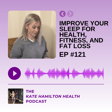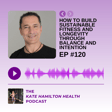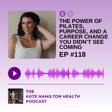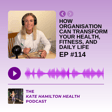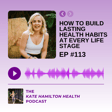
#102: Orla Foster: Rebuilding self-worth after toxic relationships
Are you ready to break free from toxic relationships and reclaim your confidence?
In this episode of The Kate Hamilton Health Podcast, I sit down with Orla Foster, a compassionate coach and therapist who specialises in helping women heal and thrive after toxic relationships.
We dive into what defines a toxic relationship, how to navigate guilt and shame, and why rebuilding self-worth is the key to moving forward. Orla shares her insights on Rapid Transformational Therapy (RTT), a powerful hypnotherapy method designed to help you uncover and reprogram limiting subconscious beliefs. Together, we explore personal development, setting healthy boundaries, and the cultural influences that shape our relationships.
Whether you’re seeking actionable steps to heal or inspiration to take the first step, this episode is your guide to transformative growth.
Episode Highlights:
[00:00] Welcome to the Kate Hamilton Health Podcast
[00:12] Introducing Orla Foster: Coach and Therapist
[00:36] What are Toxic Relationships? Signs to Look For
[02:20] Orla’s Journey: Healing and Rebuilding After Toxic Relationships
[03:43] The Power of Rapid Transformational Therapy (RTT)
[07:19] Unpacking the Complexities of Toxic Relationships
[10:45] Rebuilding Self-Worth and Setting Boundaries
[21:44] How Cultural Norms Impact Relationship Dynamics
[28:17] Deep Dive into Rapid Transformational Therapy
[34:05] Toxic Relationships: Recognizing the Patterns
[35:50] Why Self-Worth is the Cornerstone of Healing
[36:30] Dealing with Online Negativity and Emotional Triggers
[38:34] Confidence, Journaling, and Building Resilience
[45:18] The Benefits of Journaling for Healing
[48:32] Social Media, Community, and Finding Support
[49:50] Practical Resources for Personal Growth and Recovery
[53:01] Final Thoughts: Hope, Healing, and Empowerment
Links & Resources:
- Connect with Orla Foster on Instagram here
If you enjoyed this episode, please subscribe, leave a review, and share it with friends who might benefit. For more health and fitness tips, follow me on Instagram and TikTok @katehamiltonhealth.
Music b LiQWYD Free download: hypeddit.com/link/xxtopb [http://hypeddit.com/link/xxtopb] Promoted by FreeMusicPromo [https://www.youtube.com/channel/UCbycji-eySnM3WD8mbxPUSQ] / @freemusicpromo
Disclaimer:
The content shared in this episode is for informational and educational purposes only and is not intended as a substitute for professional advice, diagnosis, or treatment. If you are experiencing a crisis or need immediate support, please reach out to a qualified mental health professional or helpline in your area.



